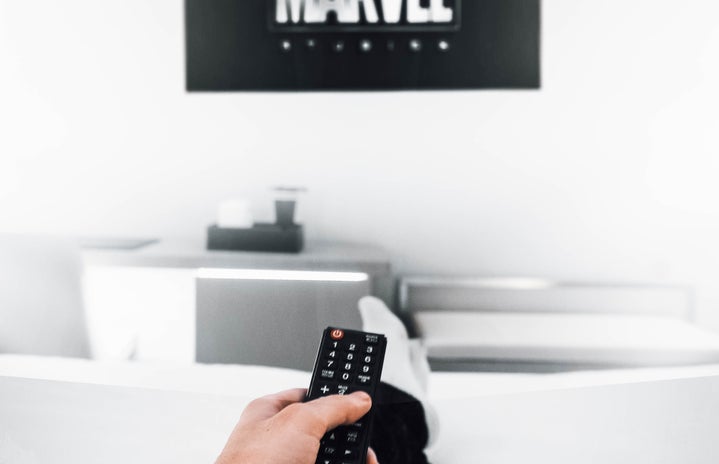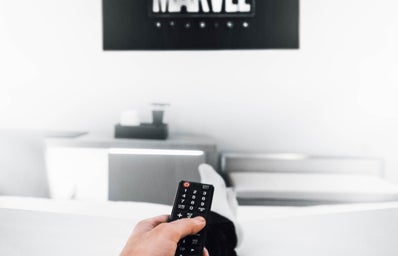I, like many others, am a huge fan of Marvel. Admittedly, I joined the game a little late in 2014, when Captain America: The Winter Soldier was released. I marathoned all the movies up until that point, slogging through the likes of The Incredible Hulk and Thor: The Dark World, while being pleasantly surprised by Iron Man. My favorite movie was and is Captain America: The First Avenger, in no small part because of Peggy Carter (Hayley Atwell). Peggy kicked ass, and she was secure in her job before she even met Captain America. Her short-lived T.V. show represented Marvel’s first foray into female led content, and despite being extremely well-loved by its fans, it wasn’t popular enough to avoid being canceled.
Image via beanclam/DeviantArt
Iron Man 2 introduced fans to Scarlett Johansson’s Black Widow, a femme fatale who’s main purpose seemed to be punching people while wearing a catsuit, something that does not go unnoticed by Tony Stark. Over the next few movies, her character and motivations fluctuated wildly, changing to be whatever the lead superhero needed her to be. Despite being one of the core six Avengers, she is frequently left off of merchandise, because the former CEO of Disney thought they’d already covered the little girl demographic with princess items. I won’t get into all the reasons Black Widow’s romantic subplot in Avengers: Age of Ultron is unnecessary and the worst, but it’s male wish fulfilment, and is highly disappointing.
Image via Marurenai/Deviantart
As time passes and more movies come out, Marvel’s roster of female characters has increased. We now have Gamora, the Scarlet Witch, Valkyrie, Mantis, and Ghost, not to mention pretty much every character in Black Panther other than T’Challa (ranked by DigitalSpy as the movie with the most female appearances). Still, it wasn’t until this summer that Marvel released its first movie with a female co-lead. This decision wasn’t without backlash, as one Twitter user critiqued the poster by saying that “[w]omen are men and men are women.” Even those supportive of a female-fronted movie seemed disappointed, with MovieWeb complaining that the alleged protagonist didn’t even show up for the first twenty minutes.
After the failure of Catwoman(a 3.3/10 rating on IMDB), studios were unwilling to take a “risk” on movies featuring women. Though Captain Marvel was announced back in 2014, it will not be released until 2019, riding the momentum of 2017’s Wonder Woman. The problem is when The Incredible Hulk failed, it was because it was a bad movie. When Catwoman failed, it was because audiences didn’t have an interest in female superheroes. Times are changing, slowly but surely. Wonder Woman is widely regarded as a bright spot in the otherwise dreary DCEU, and its sequel, Wonder Woman 1984, is already in development. The Black Widow solo film finally seems to be moving forward, and it was just announced that Disney has plans for a TV series focusing on the Scarlet Witch.
But why did it take so long to get to this point? Marvel has developed over twenty films with a white guy at the helm, and it’s taken ten years to get here. Even stranger, as Forbes points out, all of these movies take place in the past. Captain Marvel occurs in the 90s, Wonder Woman and Wonder Woman: 1984 occur in 1917 and 1984, respectively, and the Black Widow movie is rumored to take place before the events of Avengers.
Image via Boss Source/Twitter
Regardless of these idiosyncrasies, the first time I saw the word “her” fade in to “a hero” in the Captain Marvel trailer, I teared up. This is the same reaction I had when the thirteenth Doctor (of Doctor Who) was announced to be a woman. A newly released promo shows her standing underneath a dome, as glass shatters above and around her, and the text says “it’s about time”. The metaphor is obvious and wonderful. Yes, these characters and plots are fictional. But things in the real world are terrible, as we watch allegations of sexual assault be justified, and watch women fight tooth and nail for an equality that half the country seems to think we’ve already achieved. Watching the fictional glass ceiling shatter reminds me of Hillary’s planned victory speech, standing underneath a literal glass ceiling that now seems destined never to break.
Image via Shaniartist/Tumblr
T.V. shows, movies, and books provide an escape, but they also reflect the times in which they are made. Audiences, at least, seem eager for more diverse content, shown by the success of movies like Wonder Woman, Black Panther, and Crazy Rich Asians. In some respect, these films are aspirational, but also, it makes sense that we should have as many different kinds of films as there are people. Even as I look forward to the release of Captain Marvel, I am irritated by the men who tweet photoshopped images of Carol Danvers smiling. No one made such asinine comments about Tony Stark or Steve Rogers, as star Brie Larson rightfully pointed out.
Perhaps, though, this is ultimately part of the point. Fictitious strides are accompanied by unfortunately realistic and anticipated comments, but that doesn’t take away from the progress we’re making. Captain Marvel is in theaters on March 8th, which is also International Women’s Day. Is this a token gesture, made by a corporation that ultimately cares only about a profit? Maybe so. Still, it shows that Disney finally recognizes the potential of the female market, and that in and of itself is an accomplishment. I for one am thrilled to have more than one female superhero, and I look forward to the day when it’s treated as just another movie, rather than carrying the weight of an entire gender. We have so much farther to go, but it’s not wrong to appreciate how far we’ve come.


